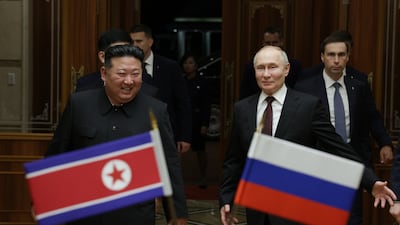Russian President Vladimir Putin arrived in North Korea in the early hours of Wednesday, promising to deepen trade and security ties with the reclusive nuclear-armed state and to support it against the US.
After a stopover in Russia's Far East, Mr Putin's plane touched down in Pyongyang at about 2.45am, Russian state media said.
How far Russia will go in support of North Korean leader Kim Jong-un is a subject of debate among the US and its Asian allies, as the country is the only one to have conducted nuclear weapon tests in the 21st century.
In a sign that Russia, which has the power of a veto in the UN Security Council, is reassessing its entire approach to North Korea, Mr Putin praised Pyongyang before his arrival for resisting what he said was US economic pressure, blackmail and threats.
In an article published by North Korean state media, Mr Putin praised “Comrade” Kim, and promised to “jointly resist illegitimate unilateral restrictions”, to develop trade and strengthen security across Eurasia.

“Washington, refusing to implement previously reached agreements, continuously puts forward new, increasingly stringent and obviously unacceptable demands,” Mr Putin said in the article.
It was printed on the front page of North Korea's Rodong Sinmun, the ruling Workers' Party mouthpiece.
“Russia has always supported and will continue to support the DPRK and the heroic Korean people in their opposition to the insidious, dangerous and aggressive enemy.”
Mr Putin issued a presidential order on the eve of the visit saying Moscow was looking to sign a “comprehensive strategic partnership treaty” with North Korea.
His foreign policy adviser Yuri Ushakov said it would include security.
Mr Ushakov said the deal would not be directed against any other country, but would “outline prospects for further co-operation”.
Mr Putin said the Soviet Union was the first to recognise the Democratic People's Republic of Korea founded by Mr Kim's grandfather, Kim Il-sung, less than two years before the 1950 Korean War.
North Korean state media also published articles praising Russia and supporting its military operations in Ukraine, calling them a “sacred war of all Russian citizens”.
Mr Putin's state visit comes amid US accusations that North Korea has supplied “dozens of ballistic missiles and over 11,000 containers of munitions to Russia” for use in Ukraine.
South Korea, a staunch US ally, has raised similar concerns.
The White House said on Monday it was troubled by the deepening relationship between Russia and North Korea.
The US State Department said it was “quite certain” Mr Putin would be seeking arms to support his war in Ukraine.
Moscow and Pyongyang have denied arms transfers but have vowed to boost military ties, possibly including joint drills.

Russia is due to outproduce the whole Nato military alliance on ammunition production this year, so Mr Putin's trip is probably aimed at showing Washington how disruptive Moscow can be on a host of global crises.
Russia in March vetoed the annual renewal of a panel of experts monitoring enforcement of long-standing UN sanctions against North Korea over its nuclear weapons and ballistic missile programmes.
The visit will include one-on-one discussions between the two leaders, as well as a gala concert, state reception, honour guards, document signings and a statement to the media, Russia's Interfax news agency quoted Mr Ushakov as saying.
Russian Defence Minister Andrei Belousov, Foreign Minister Sergey Lavrov, the ministers for natural resources, health, and transport, the heads of the Russian space agency and its railways, and Mr Putin's point man for energy, Deputy Prime Minister Alexander Novak, will be part of the delegation.
Before the visit, North Korea appeared to have been preparing for a military parade in downtown Pyongyang, commercial satellite imagery showed.
The summit presents the greatest threat to US national security since the Korean War, said Victor Cha, a former US national security official now with the Centre for Strategic and International Studies.
“This relationship, deep in history and reinvigorated by the war in Ukraine, undermines the security of Europe, Asia and the US homeland,” Mr Cha wrote in a report on Monday.
He urged Washington to work with Europe and other partners to increase economic and diplomatic pressure on Pyongyang, engage with China, and launch a major human rights and information campaign to flood the North with outside media.
North Korea has been under UN sanctions for its ballistic missile and nuclear programmes since 2006, and those measures have been strengthened over the years.

The UN Security Council has been divided over how to deal with Pyongyang.
Russia and China say more sanctions will not help and that joint military drills by the US and South Korea merely provoke Pyongyang.
Two years ago, they vetoed a US-led push to impose more UN sanctions on North Korea over its renewed ballistic missile launches.
Washington and its Asian allies accuse Beijing and Moscow of emboldening North Korea by protecting it from more sanctions.
After North Korea, Mr Putin will visit Vietnam on Wednesday and Thursday.


